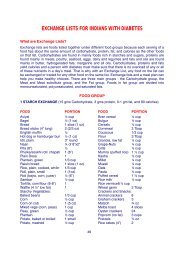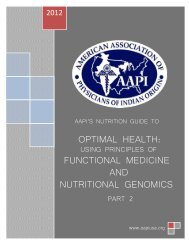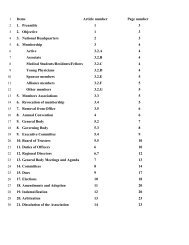functional medicine and nutritional genomics - American Association ...
functional medicine and nutritional genomics - American Association ...
functional medicine and nutritional genomics - American Association ...
Create successful ePaper yourself
Turn your PDF publications into a flip-book with our unique Google optimized e-Paper software.
AAPI’S NUTRITION GUIDE TO OPTIMAL HEALTH: USING PRINCIPLES OF FUNCTIONAL MEDICINE AND NUTRITIONAL GENOMICS<br />
b. Extensive Elimination Diet: Reduce intake of foods<br />
to a very low inflammatory diet, then gradually reintroduce<br />
foods while documenting symptoms.<br />
c. Food Sensitivity Testing: I have found that the use<br />
of the ALCAT has provided my family <strong>and</strong> my clients<br />
significant improvement in all measures of wellness;<br />
therefore, it has become the testing method of choice<br />
in my clinical practice. The test is designed to<br />
measure the innate immune response to food, allowing<br />
the patient to eliminate foods that are activating the<br />
immune system <strong>and</strong> causing downstream inflammation.<br />
IgG testing, or allergy testing, is used by some<br />
practitioners, however, there is question at this time as<br />
to whether the presence of an antibody to a food is a<br />
reliable predictor of a pathological response.(35,36)<br />
4. Take a robust pharmaceutical grade nutrient<br />
regimen:<br />
a. L-glutamine will aid in gut cell regeneration.<br />
b. digestive enzymes may aid the digestive process.<br />
c. broad spectrum probiotics have been found to help<br />
reduce the inflammation.<br />
d. multivitamin <strong>and</strong> multi-mineral.<br />
5. Journal: this process allows your client to discover<br />
the wide variety of responses their<br />
body has to certain foods, provide objective information<br />
about their diet, <strong>and</strong> underst<strong>and</strong> <strong>and</strong> change food<br />
behaviors that may be driving pathological eating<br />
habits.<br />
Keep It Simple<br />
Consider a paradigm changing thought: Wellness is the<br />
NORMAL state. We work hard to get sick. Often,<br />
instead of ordering expensive testing, I counsel clients<br />
to start their wellness program by eating only what<br />
their gr<strong>and</strong>parents would have eaten. Nearly everyone<br />
returns feeling significantly better!<br />
Concluding Thoughts<br />
Food sensitivity is a complicated problem because it is<br />
both the end result <strong>and</strong> a perpetuating factor in a<br />
vicious cycle of gastrointestinal dysfunctions. Food<br />
82<br />
2012<br />
sensitivity is important because it reflects underlying<br />
metabolic, immunologic, <strong>and</strong> anatomic abnormalities.<br />
These include various degrees of intestinal flora<br />
abnormalities, intestinal hyper-permeability, anatomic<br />
damage to intestinal micro-structures, improper<br />
digestion <strong>and</strong> absorption, <strong>and</strong> chronic activation of the<br />
immune system leading to local <strong>and</strong> systemic<br />
inflammation.<br />
The benefit of a vicious cycle is that it can be broken<br />
at any point along the chain of events. When dealing<br />
with a complicated patient, I recommend looking at<br />
gastrointestinal health immediately. This may be as<br />
simple as recommending your patient stop milk <strong>and</strong><br />
gluten products <strong>and</strong> journal symptoms for 2-4 weeks.<br />
This brief time period is not overwhelming <strong>and</strong> will<br />
allow the patient to ‚feel‛ the positive effects <strong>and</strong><br />
establish ‚buy-in.‛<br />
With a motivated or significantly ill patient, it may be<br />
appropriate to evaluate the stool for digestion,<br />
absorption, <strong>and</strong> dysbiosis <strong>and</strong> use ALCAT testing to<br />
guide their diet more specifically.<br />
There are no risks to food elimination <strong>and</strong> the benefits<br />
can be tremendous <strong>and</strong> immediate:<br />
1. promote gut healing<br />
2. reduce inflammation<br />
3. reduce immune system activation<br />
4. improve metabolic processes <strong>and</strong> reduce chronic<br />
disease<br />
Remember, WELLNESS IS THE DEFAULT STATE.<br />
From this perspective, complicated problems are<br />
simplified because underst<strong>and</strong> that the body will return<br />
to a state of health as certain physiologic, psychologic,<br />
<strong>and</strong> metabolic stressors are removed.<br />
So peel back the layers <strong>and</strong> help your patient discover<br />
wellness! Start with gut health; you can’t go wrong. I<br />
wish you the best!<br />
Jamie Wright is a Board Certified ‚reformed‛<br />
Gynecologist who fully embraced integrative <strong>medicine</strong><br />
as he helped his wife overcome autoimmune disease<br />
<strong>and</strong> chronic pain. He is pursuing a Master’s Degree<br />
from the University of South Florida Medical School<br />
with a focus on Metabolic <strong>and</strong> Nutritional Medicine. He<br />
is also board certified by the <strong>American</strong> Academy of

















